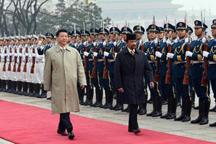The Indian Supreme Court’s ruling that only genuinely new inventions should be granted patents means that medicines can still be affordable.The front office of Novartis in Mumbai, India, Monday, after India's Supreme Court rejected drug maker's attempt to patent a new version of a cancer drug Glivec. PATIENTS around the world who look to India for low-cost medicines to treat their ailments heaved a sigh of relief last week when the Indian Supreme Court turned down a claim for a patent for a cancer drug.
This means that drug companies in India can continue to produce generic versions of the same drug, Glivec or Gleevec, at a much lower price, thus making it affordable to thousands more cancer patients.
Glivec, produced by the Swiss-based company Norvartis, can cost a patient up to US$70,000 (RM217,000) for a year of treatment, whereas the generic versions of the same medicine made by Indian companies cost around US$2,500 (RM7,750). The drug is used to treat some forms of leukaemia as well as a rare type of stomach cancer.
The Supreme Court decision also seems to open the road for patents not to be granted for more medicines, since it confirmed that only drugs that are genuinely a new invention can be granted patents.
When a patent is granted to a company for a drug, other companies are not permitted to produce generic versions of the medicine for a period of 20 years or so.
The monopoly given to the patent holder enables it to charge high prices since there is a lack of competition.
Many or even most patients are unable to buy the medicines, giving rise to frustration and despair especially when their lives are at stake.
Some companies whose patents are about to expire apply for a new patent for the same drug after changing the composition slightly or changing the form of the drug.
The “new” drug is often not a new invention, but only a minor modification that is made with the aim of having the patent renewed for another period. This practice is popularly termed “evergreening” of the patent.
An extension of the patent term means that the company continues to enjoy the monopoly and high prices, which continue to be out of reach to many patients.
Although governments are obliged to have laws allowing for patents to be given for inventions under the World Trade Organisation’s TRIPS agreement, each country is allowed to set its own definition and standards for what is an invention.
The Supreme Court decision confirms that the Indian patent authorities exercised their powers lawfully and properly when they rejected the patent application for Gleevec on the ground that the medicine was not a new invention.
Novartis had challenged the interpretation given by the Indian Patent Office to Section 3 (d) of the Indian Patents Act that seeks to prevent the grant of patents for non-inventive new forms of known medicines.
The Novartis application had claimed a patent for a new salt form (imatinib mesylate), a medicine for the treatment of chronic myeloid leukaemia, sold under the brand name Gleevec (or Glivec in other countries).
The Indian patent office had rejected the patent application on the ground that the claimed new form was anticipated in an earlier US patent of 1996 for the compound imatinib and that the new form did not enhance the therapeutic efficacy of the drug. The decision was upheld by the Indian Patents Appellate Board.
The legal challenge from Novartis had caused anxiety among patients groups, governments of developing countries and some international organisations in view of the possible negative implications for access to affordable medicines if the Norvatis petition succeeded.
Most developing countries rely on Indian generic drug companies for the supply of low-priced medicines for many diseases.
A weakening of the interpretation or use of Section 3 (d) would have enabled multinational drug companies to extend their patent monopolies based on “evergreening” or “trivial” incremental improvements which could delay the supply of generic medicines for the treatment of HIV/AIDS, cancer and other diseases.
The decision by the Indian Supreme Court is thus of major significance not only for India but for patients and health authorities in the developing countries.
In interpreting Section 3 (d), the Supreme Court observed that this section was introduced in the 2005 amendment to the Patents Act to ensure that while India allowed product patents on medicines in accordance with its WTO obligations, it did not compromise public health through “evergreening” of pharmaceutical patents.
The court hence took into account the concerns about the impact of the TRIPS agreement on public health and on the development of an indigenous pharmaceutical industry.
Moreover, it considered the implications of the Novartis case for the availability of essential medicines at affordable prices globally.
The court decision reproduced two letters from Dr Jim Yong Kim, the former director of the Department of HIV/AIDS at the World Health Organisation (current president of the World Bank) and from UNAIDS to the Indian health minister expressing their concerns relating to the continuous availability of affordable Indian generic drugs in other developing countries.
Thus, the Supreme Court decision has implications beyond India. It upholds the high standards by which drug patent applications can be processed. While genuinely new inventions are granted patents, drugs that are not really new need not.
The implication is that Indian generic companies can be expected to produce many more medicines in future, and continue their reputation as the “pharmacy of the developing countries”.
It is also heartening that the court decision reaffirms the priority for concerns for the patients’ right to receive treatment at more affordable prices.
The court decision is also likely to spark interest among other developing countries about the Indian patent law and the policies guiding it. Developing countries can learn from the Indian approach of balancing patents and public health.
Global Trends
By MARTIN KHORRelated posts: The US Pacific free trade deal that's anything but free?ASEAN plans world's largest trading bloc in Asia, the ...








